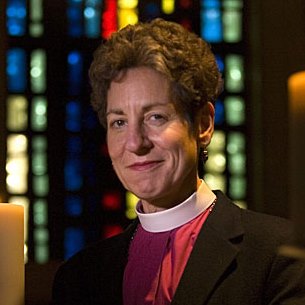15 May 2011
The Most Rev. Katharine Jefferts Schori
Presiding Bishop and Primate
The Episcopal Church
Your bishop and I came from a meeting with the Old Catholics in Utrecht yesterday, and in those vast fields in the green heart of Holland, we saw large numbers of sheep. They were ranged along the sides of all the highways, and in pasture after pasture in the countryside. They are surely the source of excellent lamb and chèvre. They are also certainly far healthier and more robust than the sheep Jesus spoke about. Surprisingly, we didnât see any in Belgium or France. Those fields are certainly lush, but theyâre devoted to row crops, grain, or pasture for cows.
Sheep in ancient Palestine didnât have access to those lush green pastures, nor to the good veterinary care they get in modern agricultural operations. As a former goatherd, I can tell you that sheep are not very bright. Goats have a bad reputation in the ancient world because they can get through fences and out of almost any enclosure. Sheep are far more tractable, but they can be just as easily led astray as into healthy pasture.
Those who would lead the sheep astray, says Jesus, are thieves and bandits, and they donât bother to use the gate or door into the enclosure where the sheep sleep at night. The wolves or predators who jump the fence are mischief makers. They canât get through the door because any decent shepherd would keep watch there all through the hours of darkness, literally lying down to sleep in the entrance to the corral. A wolf would have to walk right over the shepherd.
Jesus calls himself the door of the sheep, and says whoever turns his way will be healed or saved or preserved from danger. Thatâs a pretty familiar image â the Lord is my shepherd, leading me to pastures richer than any ever seen in ancient Palestine, to clean and abundant water, along good roads, guiding me with his walking stick and keeping me safe.
But Jesus uses another surprising image thatâs easy to miss in translation. He says, âwhoever enters by me (the gate or door) will be saved or healed, and will come in and go out and find pastureâ⦠and a bit later, âI came that they may have life, and have it abundantly.â The word for pasture means something more like âspreading,â like that vast green carpet you can find in the lowlands in the spring. A rich lawn of grass and herbs, something only hinted at in the brief flush of growth in the Palestinian spring. Jesusâ sheep pasture is a vision of rich and nourishing food that doesnât end. Itâs a vision of the garden of Eden, which the children of Abraham have yearned for since they first arrived in that part of the world and discovered how hard it is to make a living off thin, rocky soil.
Jesus is the gate through which his sheep move out into a world spread with abundance, and he says so directly, âI came that they may have life, and have it abundantly.â His people havenât known abundance, but thatâs what a vision of right relationship looks like â no one is in want, everyone has enough to eat and even enough for a feast.
Thereâs a similar image of what this shepherd provides in the psalm for today: âYou spread a table before me in the presence of my enemies.â Another vision of abundance meant for human beings, itâs the radical, overwhelming abundance that will put jealousy and enmity to rest, and end the striving that characterizes so much of human existence. In the presence of that kind of abundance, there will be no more war.
âWhoever enters by me,â says Jesus, âwill come in and go out and find pasture.â What do you find when you go out that door at the end of the mass? Has your vision and understanding shifted enough that you can see rich and spreading pasture? Does your heart sense abundance, rather than scarcity?
